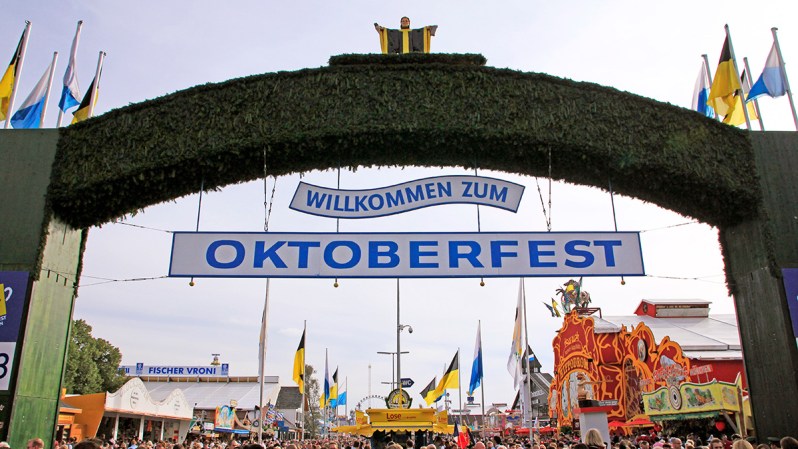
The Bavarian festival that is Oktoberfest is going to look a little different this year. While the actual annual festival has been cancelled, that does not mean you can not celebrate in your own home or socially-distanced with friends. Below, you’ll find a history of the holiday and what you could do to host your own celebration.
Much like the other alcohol-forward holidays appropriated in America, Oktoberfest has become a favorite within the United States as local breweries take the opportunity to honor the frothy tradition of Märzen bier, the amber lager quintessential to Oktoberfest that originated in Bavaria and can be translated to “March beer.”
So, Oktoberfest takes place in September and celebrates a March beer? Das stimmt!
Oktoberfest has become largely an agricultural celebration of the last harvest before summer. “Märzen was brewed in March, laid down in casks during the summer, and aged to be ready for the celebration,” says Brandon Jacobs of Great Divide Brewery. “It used to be that before you go and plant your fields in the summer, you brew one last beer for the year, and that is in March. Back then, you wouldn’t be able to brew over the summertime since it’d be too warm for yeast to ferment. Instead of brewing over the summer, you’re working in the field. Come September/October, you get to celebrate that you’ve brought in the harvest.”
“Oktoberfest for me today is a celebration of the bounty of the land tying it back into beer,” Jacobs adds. “It’s a time to slow down and reflect on the work done over the summer.”
Today, the celebration includes stein-hoisting, pretzels, and lederhosen. However, the original Oktoberfest party was a little different, as it had a wedding and a horse race.
Oktoberfest History

Oktoberfest began on October 12, 1810, when Crown Prince Ludwig got hitched to Princess Therese of Sachsen-Hildburghausen. These royals strayed from bougie tradition and turned the wedding into a public event, inviting the people of Munich to come to the fields in front of the city gates and celebrate the union.
The shindig lasted for days; free food and beer flowed through the city. In the beginning, this beer was darker and maltier, closer to a Munich dunkel. The celebration concluded with a horse race.
Seeing as the royal family couldn’t celebrate a wedding every year on October 12, it was the annual horse race that promoted the tradition of Oktoberfest. In modern Munch, this tradition has been drunk under the table.
Oktoberfest Beer
Oktoberfest attendees were forced to switch to a Vienna-style lager in the late 1800s when Munich breweries ran out of the darker lager, according to the American Homebrewers Association. “After the First World War, the color evolved into a reddish-brown, Märzen-like hue. Today, the Oktoberfest style has settled into session strength, malt-forward lager with a beautiful golden to copper color. But who knows what the Oktoberfest style 50 years down the road will look and taste like,” the AHBA says.
In Munich, the qualifications for beer served at Oktoberfest is pretty rigorous.
In Munich, the qualifications for beer served at Oktoberfest is pretty rigorous. First, the brewery has to be operating in the city and pass strict German beer purity laws (the “Reinheitsgebot“).
In the United States, breweries hosting Oktoberfest celebrations are far more relaxed but like to stick with the classics: i.e. a märzen. Great Divide Brewing, for instance, honors the iconic Bavarian bash by tapping its award-winning HOSS lager layered with malt notes, hints of cherry and dark fruits, and a unique addition of rye that imparts a slightly earthy, spicy character.
The Eastern European-style brewery, Seedstock, is serving a märzen that is amber in color and smells of malty sweetness. Not satisfied with simply tapping an Oktoberfest beer, Seedstock will host an Oktoberfest party complete with an authentic Polka band and stein hoisting.

If you don’t have a local brewery that makes an Oktoberfest-style beer, your best bet here in the states is to find a bottle from Weihenstephan, a Bavarian brewery founded in freaking 1040, aka the oldest brewery in the world. Weihenstephan’s Festbier is as good as it gets.
Sam Adams also makes an Octoberfest beer that is super malty with German Noble hops and additional (more Americanized) caramel and toffee flavors.
Article originally posted September 2018. Last updated September 2020.
Editors' Recommendations
- A brief history of Mardi Gras – find out how this tradition with beads started
- Celebrate Oktoberfest With These 10 German Spirits And Liqueurs


